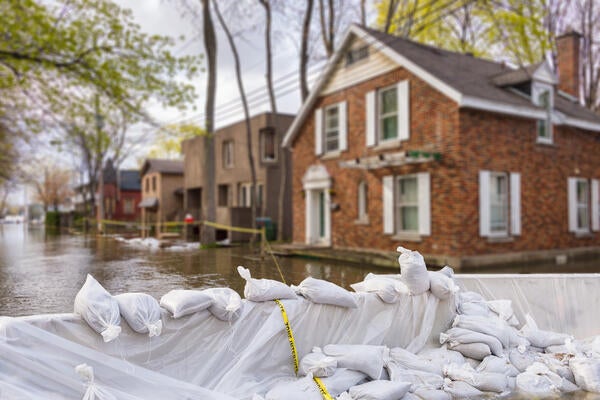
Improving access to more affordable flood insurance
Study concludes insurers and municipalities sharing data could improve availability and affordability of property insurance

Study concludes insurers and municipalities sharing data could improve availability and affordability of property insurance
By Media RelationsThe increasing cost of flood damage has seen property insurance become less affordable for many Canadians. New research from the University of Waterloo shows that if insurers and local governments pooled information on investment in flood-risk management, that data could result in more affordable insurance coverage and premiums.
A team of climate researchers from Waterloo’s Faculties of Environment and Arts developed a research platform that demonstrates the benefits of sharing risk data based on feedback from insurers and local governments.
According to the Insurance Bureau of Canada, more than 10 per cent of homeowners in Canada can’t get flood insurance.
“Insurance companies use data to calculate a property’s flood risk and the resulting costs, including information on the characteristics of a house or the surrounding area,” said Dr. Jason Thistlethwaite, a professor in the Faculty of Environment at Waterloo and co-lead of the Climate Risk Research Group.
“But municipalities use data to identify flood-prone areas of a town or city and make decisions to prevent and mitigate flooding to neighbourhoods with measures like upgrades to infrastructure. The problem is, they haven’t been working together and the consumer is on the hook.”
A recent study from Statistics Canada indicates that there were more than $3 billion in claims from extreme weather last year, one of the worst years for insured losses in Canadian history.
“If we continue to ignore this gap in insurance coverage, it is only going to get worse,” said Dr. Daniel Henstra, a professor in the Faculty of Arts at Waterloo, and co-lead of the Climate Risk Research Group.
“Governments and insurers are missing an opportunity to make infrastructure more resilient. Data that demonstrate how investments in risk reduction lead to lower premiums even over the long term would go a long way to improving the business case for climate resilience.”
The study, Evaluating a public-private data-sharing platform for improving flood insurance availability and affordability in Canada, appears in Regional Environmental Change.

Read more
Researchers awarded funding to investigate ecology, climate change, repatriation, health and well-being through cultural and historical lens

Read more
Twenty-six researchers receive federal funding to drive discovery, innovation and research infrastructure development

Read more
Waterloo researchers propose solution to help communities escape the costly cycle of flood damage and rebuilding
The University of Waterloo acknowledges that much of our work takes place on the traditional territory of the Neutral, Anishinaabeg, and Haudenosaunee peoples. Our main campus is situated on the Haldimand Tract, the land granted to the Six Nations that includes six miles on each side of the Grand River. Our active work toward reconciliation takes place across our campuses through research, learning, teaching, and community building, and is co-ordinated within the Office of Indigenous Relations.